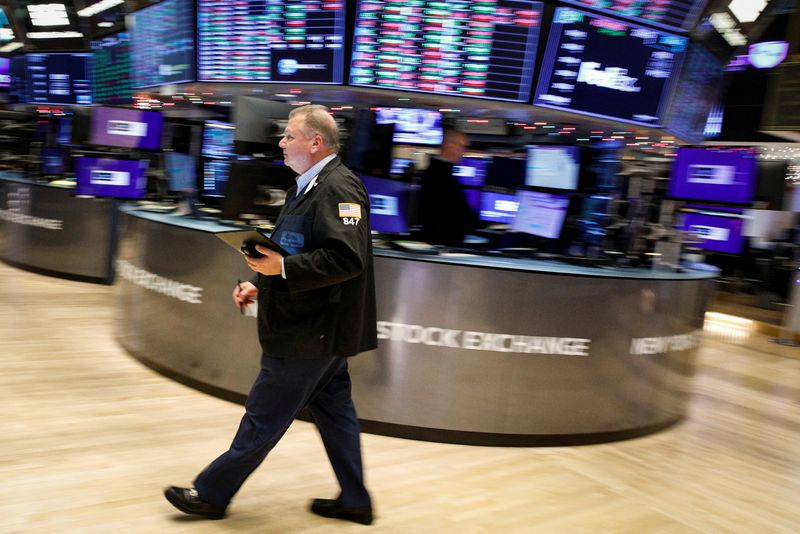
FILE PHOTO: Traders work on the floor of the New York Stock Exchange (NYSE) in New York City, U.S., December 3, 2021. REUTERS/Brendan McDermid
December 20, 2021
By Shreyashi Sanyal and Anisha Sircar
(Reuters) -U.S. stock indexes fell more than 1% on Monday, dragged down by concerns about the impact of tighter COVID-19 curbs on the global economy, and a potentially devastating setback to President Joe Biden’s investment bill.
Surging global infections of the Omicron coronavirus variant have sparked worries in financial markets as many European nations and Britain weigh the possibility of restrictions during Christmas.
“Typically what happens in Europe is a bit of a preview for what we see in the United States. So, if we see a lot more infections in the U.S., it could stress hospitals, make people less reluctant to get out, spend, and partake in the economy. That’s definitely a cause of concern,” said Chris Zaccarelli, chief investment officer at Independent Advisor Alliance.
All of the 11 major S&P 500 sector indexes fell, with energy tumbling 2.4% as oil prices slumped by about $3. [O/R]
Technology, communication services and consumer discretionary, the sectors which house majority of mega-cap growth stocks, extended their slide from the previous session.
Denting the market’s sentiment further, U.S. Senator Joe Manchin said on Sunday he would not support Biden’s $1.75 trillion domestic investment bill.
Goldman Sachs trimmed its quarterly U.S. GDP forecasts for 2022 after Manchin’s comments.
The developments come at a time when the Federal Reserve decided last week to end its pandemic-era stimulus faster, with the central bank signaling at least three quarter-percentage-point interest rate hikes by the end of 2022.
“So we could be seeing a little bit of downward pressure on growth forecasts for next year and as a result, we may be seeing some of that reverberate through the market as well,” said Charlie Ripley, senior investment strategist for Allianz Investment Management.
“To some extent, they’ll (lawmakers) probably go back to the table and try and figure out some parts of this plan that they may like to pass going forward, but in this current form, it doesn’t seem like something that’s going to happen at this point.”
Investors have taken a more defensive stance this month, with S&P 500 sectors such as consumer staples, real estate and utilities leading sectoral gains so far in December.
The CBOE Volatility index, a gauge for investor anxiety, gained over 4 points and rose to its highest level in two weeks on Monday.
At 12:00 p.m. ET the Dow Jones Industrial Average was down 618.07 points, or 1.75%, at 34,747.37, the S&P 500 was down 74.89 points, or 1.62%, at 4,545.75 and the Nasdaq Composite was down 245.91 points, or 1.62%, at 14,923.77.
Oracle Corp fell 4.1% after the enterprise software maker said it would buy electronic medical records company Cerner Corp for $28.3 billion. Shares of Cerner added 1.0%. [nL4N2T53E8]
Declining issues outnumbered advancers for a 5.89-to-1 ratio on the NYSE and for a 3.66-to-1 ratio on the Nasdaq.
The S&P index recorded two new 52-week highs and 11 new lows, while the Nasdaq recorded 10 new highs and 280 new lows.
(Reporting by Shreyashi Sanyal and Anisha Sircar in Bengaluru; editing by Uttaresh.V and Maju Samuel)

